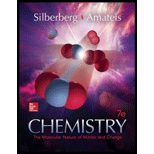
(a)
Interpretation:
The hybridization of carbon, oxygen and nitrogen atoms in epinephrine is to be determined.
Concept introduction:
Hybridization is the process of intermixing of atomic orbital of slightly different energies to form hybrid orbitals that have similar energy. These orbital have lower energy and more stability than the atomic orbital.
Hybridization of the atom can be determined from the number of electron groups around that atom in the Lewis structure of the molecule. Single bond, double bond, triple bond and lone pair all are considered as single electron group.
(b)
Interpretation:
The number of sigma bonds in epinephrine is to be determined.
Concept introduction:
The sigma bond is the covalent bond that is formed by the axial overlap of orbitals. It can be bonding or anti-bonding interaction. Bonding interaction takes place when there is an overlap of orbitals in the same phase and antibonding interaction occurs when the orbital overlap in opposite phase. It is a very strong bond.
Sigma bond is formed by the end to end overlapping of atomic or hybrid orbitals. All single bonds are sigma bonds. One double bond is made up of one sigma bond and one pi bond. One triple bond is made up of one sigma bond and two pi bonds.
(c)
Interpretation:
The number of pi electrons that are delocalized in the ring of epinephrine is to be determined.
Concept introduction:
The pi bond is formed by the lateral overlap of orbitals. The electrons involved in pi bond formation are the pi electrons. The delocalized electrons are the electrons that are not restricted in any region between the two carbon atoms but spread over all the surrounding carbon atoms. It increases the stability of the molecule through resonance.
Want to see the full answer?
Check out a sample textbook solution
Chapter 11 Solutions
Chemistry: The Molecular Nature of Matter and Change - Standalone book
 ChemistryChemistryISBN:9781305957404Author:Steven S. Zumdahl, Susan A. Zumdahl, Donald J. DeCostePublisher:Cengage Learning
ChemistryChemistryISBN:9781305957404Author:Steven S. Zumdahl, Susan A. Zumdahl, Donald J. DeCostePublisher:Cengage Learning ChemistryChemistryISBN:9781259911156Author:Raymond Chang Dr., Jason Overby ProfessorPublisher:McGraw-Hill Education
ChemistryChemistryISBN:9781259911156Author:Raymond Chang Dr., Jason Overby ProfessorPublisher:McGraw-Hill Education Principles of Instrumental AnalysisChemistryISBN:9781305577213Author:Douglas A. Skoog, F. James Holler, Stanley R. CrouchPublisher:Cengage Learning
Principles of Instrumental AnalysisChemistryISBN:9781305577213Author:Douglas A. Skoog, F. James Holler, Stanley R. CrouchPublisher:Cengage Learning Organic ChemistryChemistryISBN:9780078021558Author:Janice Gorzynski Smith Dr.Publisher:McGraw-Hill Education
Organic ChemistryChemistryISBN:9780078021558Author:Janice Gorzynski Smith Dr.Publisher:McGraw-Hill Education Chemistry: Principles and ReactionsChemistryISBN:9781305079373Author:William L. Masterton, Cecile N. HurleyPublisher:Cengage Learning
Chemistry: Principles and ReactionsChemistryISBN:9781305079373Author:William L. Masterton, Cecile N. HurleyPublisher:Cengage Learning Elementary Principles of Chemical Processes, Bind...ChemistryISBN:9781118431221Author:Richard M. Felder, Ronald W. Rousseau, Lisa G. BullardPublisher:WILEY
Elementary Principles of Chemical Processes, Bind...ChemistryISBN:9781118431221Author:Richard M. Felder, Ronald W. Rousseau, Lisa G. BullardPublisher:WILEY





